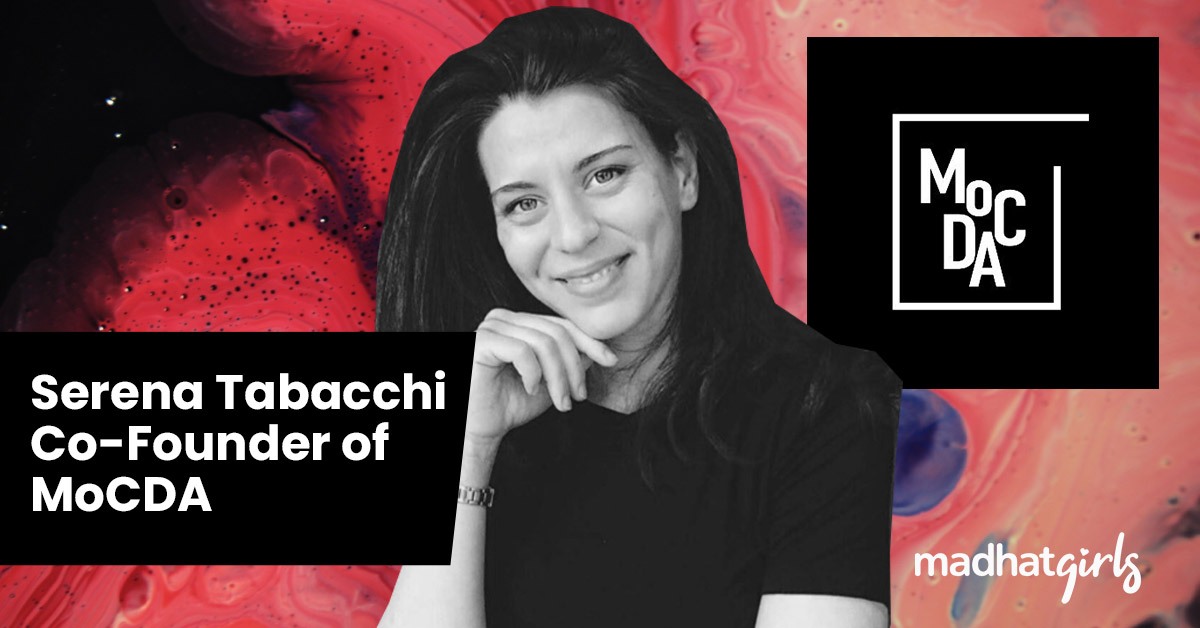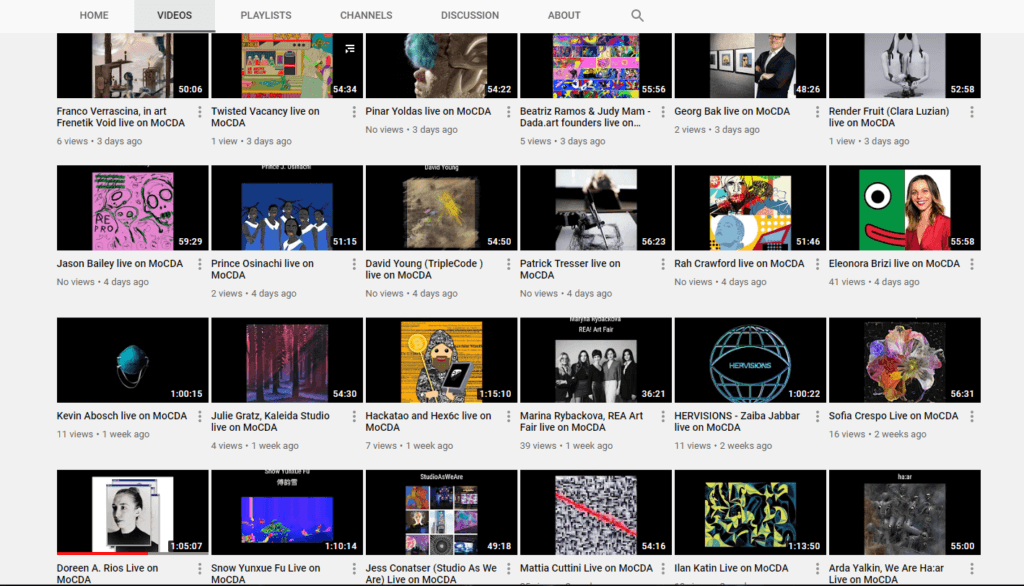What Is It Like To Be a CEO & Co-Founder of A Creative Business?

Serena Tabacchi, CEO and Co-Founder of MoCDA
In this interview, we invited CEO and Founder on MoCDA, Serena Tabacchi for a chit chat. Serena discusses the founding of her business, Museum of Contemporary Digital Art and how she maintains a work well-balance between her own business and part time job.
Serena discusses the benefit of having two jobs but also the reasons why. She explains her inspiration, interests within digital art and how took the opportunity to create a digital museum. Exploring and discovering ways to promote digital art, whether that be through educating or collaborating with fellow creatives; networking is also a fundamental part of her journey.
1. Please introduce yourself and MoCDA. Could you elaborate what MoCDA’s services and products are?
Hi and thank you for inviting me to take part in this interview. I am Serena, Co-Founder and CEO at MoCDA.
MoCDA is the Museum of Contemporary Digital Art dedicated to exhibiting, promoting, educating and researching digital art. We are creating a museum platform at the intersection of art and technology with a focus on living artists creating art in collaboration with technology. We are looking at virtual and augmented reality, mixed media art, moving image, video, generative art, crypto, 3D, 4D and art that has a digital element as part of its creative process or rendering.
2. How did you discover MoCDA? Was it due to an opportunity in the market?
MoCDA was founded by three of us, myself, Dominc and Tom who you can read more about on the platform. Dominic, the current CTO and co-founder of MoCDA attended the art + tech summit at Christie’s back in 2018 where he first met with Jason Bailey, the founder of artnome, and today co-director and art advisor at MoCDA.
After the summit we decided to create a museum platform that could facilitate the education and promotion of digital art. This is how the museum was born.

MoCDA was created because there was and still is a need for digital contemporary art to be represented and appreciated but also for artists to be supported and introduced to the art market, while raising awareness about the impact of cutting edge technologies now in development and available for the art industry.
3. You work with a collective of people and created a team within MoCDA. What was the process like in finding creatives to join your team?
Connecting with people is something I’ve always been keen to do, in life, in general.
I’m a social animal, I like to talk, learn, engage in conversations about art and most of all find ways for people to empower each other. The MoCDA team formed very naturally, people approached us and we’ve approached them.
Where? Online, of course and in real life during art events, conferences, fairs and sometimes even randomly. I very much believe in the law of attraction, even for art and in business, people have a way of finding each other. But if you’re open for opportunities and are a good listener, you are definitely going to meet interesting people.
4. In terms of networking, you regularly visit art fairs and organise interviews with creatives around the world. What are the processes and the importance of doing these activities?
When we started talking about our project we were, I must admit, a bit shy – because when you put the word museum in front of art, specially digital art, things started to get serious. But we had to break from that and we went out and talked to artists and the art industry about our ideas and project.
This was very well received and invitations to art fairs and collaborations started to arrive our way. The first collaboration we had and are still very proud to support is CADAF the Contemporary & Digital Art Fair. Attending fairs and events is important because it’s a great way to network, discover new art and stay informed about new trends in art.

5. Are there any future projects at MoCDA you are focusing on?
We are focusing on two major projects right now, our artists talks series which will link to an online art show about art in quarantine and we are working with curators and artists to create our digital art collection.
6. Why do you think digital art is still a medium that has not fully fruition in the art world yet?
Digital art is great, we love it and we see it everywhere, Instagram for example is where digital art lives. But artists have struggled to take their art anywhere else… I believe digital art gets often unnoticed because it’s not always understood, or appreciated – therefore, it is not valued as it should. It’s about telling the story of digital art, and talking about how artists create.
Most think it’s easy to create digitally, which is a false impression. Art is Art, whether digital or not and this should be recognised for its story, its message and the talent of the artist. Hence, a reason for a dedicated museum to exist and support it.
7. You currently run your business whilst working part time at Tate. Does this work balance work for you currently? How would you financially support yourself as well as the business?
Launching a project while being employed can be tough, but not impossible. You need to know what you’re getting into and the first thing to know is yourself, your commitments and have clarity when making decisions.
Of course, there will be ups and downs, but this is life. If what you’re passionate about keeps you up at night, you should listen to that voice and pursue your projects. That said, London is very expensive and I couldn’t have done it without the support of a job, my family and friends – working at Tate gives me the strength, the courage and the determination to keep a balanced life.
It can be overwhelming at times, that’s why it is important to switch context and to challenge your vision. Working on multiple projects gives you that opportunity, which it’s very precious.
8. In terms of your demographic, would you agree that MoCDA tries to target a worldwide audience? Is focusing on digital art a great platform for that?
Being online gives you the opportunity to reach out to audiences from anywhere in the world, as long as we have the internet and a device. We are trying to keep the museum and art we present as international as possible. Digital art is not the only medium to have reached a wide audience, but it is certainly a convenient and more accessible way for many to access the art world – I also wanted to say that this shouldn’t prevent you from connecting to local artist and art communities.

9. As a start-up, what are your expectations and will you eventually go full time at MoCDA?
It is likely the workload will increment. I mean, things these days are very unpredictable (probably listening back to this in a year’s time – who knows what’s going to happen) but I feel we are living in interesting times, and this is an opportunity we should consider, and devote ourselves to.
I think COVID-19 has been allowing people, and definitely myself, to reconsider many aspects of my life and I do believe that supporting artists and the art communities is what I want to do.
10. Is there any guidance you would give for anyone entering self-employment?
Just do it, if you have a good reason. If you think too much about it, ask your friends, family (sometimes best not to…) you might change your mind and regret it one day. What I really feel to suggest though is to have some funding before going self-employed or at least a space where you can sit with your thoughts and be creative about your business idea. What you should really avoid is having the stress of not knowing how to pay your bills. That is not productive – so if you can manage to sustain yourself, then definitely follow your path.
Now, Serena, speaking here: I moved to London about ten years ago and I have been working since. It’s important to have a job – for me it was vital. It is not a contradiction with what I said but, just the reality of things.
11. If you could choose a role model, who would it be and why?
I am a fan of people who have great ideas and empower others to shape their future. During my MA studies I had the opportunity to be in Paul Sirret class at RADA. Paul is a playwright, musician, and an amazing human being. He inspired me to write my first play and made me believe in my ideas. Sometimes you need someone like Paul who makes you believe in your ideas to get confident.
Steve Jobs for the revolutionary ideas on technology and determination… but I wouldn’t take it as a role model.
12. Any useful resources you use to help within your role as CEO at MoCDA?
It’s good to stay informed and read a lot! The internet is an endless resource – I think The International Journal of Arts and Technology and the MIT press journal are great resources.



